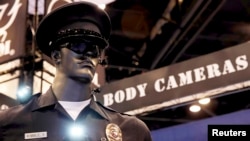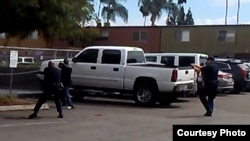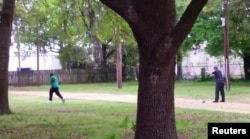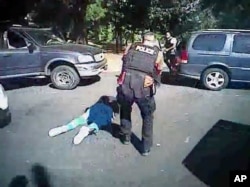After El Cajon, California, police shot dead an unarmed black man said to be mentally ill, they released a photo from a bystander's cellphone video, showing the man in a "shooting stance" against the officers.
The image does not show clearly if Alfred Olango, 38, was holding anything, and officials had no police body camera video showing the officers' view of the shooting. Police said they recovered a vape smoking device, not a gun, from the scene.
Officials voted months ago to purchase body cameras for police in the city of 100,000 residents 15 miles (24 km) northeast of San Diego. They have not yet been delivered, the police department said in a statement.
After controversial police killings in several cities including Ferguson, Missouri; North Charleston, South Carolina; and Chicago, pressure has mounted for the nearly 18,000 local, state and federal law enforcement agencies across the United States to issue the cameras to their officers.
Yet the rollout has been slow.
About 95 percent of U.S. law enforcement agencies had a camera program or intended to adopt one, according to a December 2015 survey conducted jointly by the Major Cities Chiefs Association and Major County Sheriffs Association.
To speed things along, the U.S. Justice Department on Monday granted a total of $20 million to 106 law enforcement agencies to help purchase body cameras. But even that sum would cover just a sliver of what it would take to outfit all police officers in the United States, experts said.
Suspicion of cameras
Some localities have resisted body cameras, citing the cost of storing data, distrust of how video will be used or lack of research into its usefulness.
"The technology is just not there yet, and the cameras show only a small point of view," said Shannon Martin, a city council member in Port St. Lucie, Florida. The city is among those that have debated cameras but not bought them.
In Madison, Wisconsin, mistrust between residents and police is high enough that some residents were concerned that police would manipulate video content and use it against marginalized communities.
"I don't think it would resolve the issues we're facing. It would give the police another tool to harm the community," said Veronica Lazo, who co-chaired an advisory committee on the subject in Madison.
Pros, cons for police
Many police departments support body cameras, saying videos will vindicate officers in the vast majority of cases.
A video can be a "tremendous asset" that gives context to an officer's actions, said Martin Mayer, a California lawyer who specializes in defending government agencies including police departments.
"What it does provide in many instances is not only the perspective of the officer, but also what leads up to the use of force," Mayer said.
Pockets of police continue to resist. Some unionized police officers have sued cities over being required to wear cameras.
Others worry body cameras may make officers too inhibited, constantly watching what they say.
"The industry shoved this down everybody's throat, and political people threw up their hands and said, 'We've got a panacea here,'" said Eugene O'Donnell, a former New York City police officer who teaches at John Jay College of Criminal Justice.
Footage is often inconclusive or subject to interpretation, especially for those not trained on what to look for.
In Charlotte, protesters this month demanded to see videos taken at the scene when a police officer shot dead Keith Scott.
Local police initially resisted releasing the video, saying it would not be conclusive. When they did, it failed to settle the question of whether Scott had been holding a gun.








